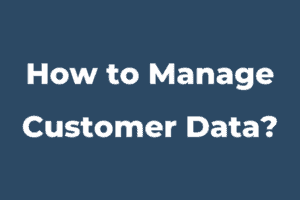Customer Data is the new currency for contact centers in 2023 and beyond. Businesses can utilize this data to gain a significant competitive edge over their competitors while also creating customer loyalty programs. Unfortunately, there are situations when fraud or scams are carried out using client information.
Beyond adhering to data privacy laws and regulations, contact centers should implement better practices for enforcing customer data security and protection.
In this article, we will explore the most effective ways to safeguard your contact center’s valuable data. We will cover topics such as data encryption, interactive voice response (IVR) for filtering calls, security training for employees, and using proper security solutions. We will also discuss why customer data privacy and security matter for contact centers.
Key Points:
- Encryption is a powerful tool for safeguarding private information, whether it belongs to your business or a client.
- Interactive Voice Response (IVR) is excellent for filtering calls and blocking scammers
- Contact centers must provide agents and other employees with security training in order to prevent hacking and data leaks.
- You must use proper security solutions to ensure the secrecy of your operations.
Why customer data privacy and security matter for contact centers?
There should never be any slack given to data security in the workplace, regardless of the type oof industry you’re operating in. Regulations designed to protect individuals’ personal information are followed by businesses around the world. Some of the most widely used norms set by contact center regulators are:
- HIPAA (The Health Insurance Portability and Accountability Act) a privacy law that prevents the unauthorized disclosure of private health information.
- The General Data Protection Regulation (GDPR) is a piece of EU regulation that gives consumers more say over their personal data by making businesses answerable for how they treat it.
- The California Consumer Privacy Act (CCPA) is a piece of legislation that was passed to give residents of that state more control over the commercial use of their personal information.
For your contact center, protecting your customer data means also:
- Preserving a solid brand name that has taken time and effort to establish
- Avoiding fines or penalties for non-compliance with regulation
- Improving customer engagement
- Keeping your best employees or expand operations
Establishing norms and processes for data management within your contact center
Customer Data Encryption
Make sure that your contact center software is capable of encrypting all of your data transfers, including voice, audios, and text messages. Data is unreadable without the associated encryption key, even if it is taken.
Encryption is a powerful tool for safeguarding private information, whether it belongs to a business or a client. Using an encrypted system at the contact center is one more way to stay in line with the law.
Also, by reviewing the logs and recordings of calls, fraudulent patterns can be uncovered. Your team’s developers can use AI to analyze this information for suspicious patterns and implement a system to block fraudulent calls before they come in.
At Nobelbiz, our mission is to elevate both simplicity and efficiency as industry standards, while constantly updating to the latest technological developments and keeping costs in check. And complying with government and industry regulations is mandatory for any contact center.
Our Cloud contact center software NobelBiz Omni+ is fully compliant and features many advanced security measures to protect customer information and sensitive data.
Interactive Voice Response (IVR) for filtering calls
If you want to stop getting annoying calls from scammers, you should sort and arrange your contacts. Calls that overwhelm your contact center might be redirected with the help of appropriate contact center software. You can filter out potentially dangerous numbers and set up priority call forwarding. In this way, clients and potential clients may easily get in touch with the person they last communicated with.
In two ways, call screening with an IVR (interactive voice response) can be helpful. The first is directed squarely at our article’s mock users. In the absence of a highly sophisticated and focused attack, phantom users will be prevented from proceeding with the call after this screening. The second perk of IVR is that it may filter out less relevant options and route the caller to the appropriate service.
Maintain privacy settings over the entire customer journey
Customers’ information is shared at every point in the process. As such, you may want to think about adopting measures at each level to ensure the safety of data transfer. Set up more authentication with your clients and have them informed of the actions you have done. By doing so, you’ll establish credibility with your customers, which will ease their minds about making a purchase. This is key in encrypting all financial data.
As businesses strive to become more agile and flexible, they have recognized the need to eliminate technological silos inside their enterprises. Since urgency drives intent, the understanding of technology has gotten more precise, and the urgency of transformation has increased. Listen to Hemanth Gorur Vice President Consulting Services at CGI and what he has to say about Breaking down silos with secure cloud strategies.
Data security training for contact center employees
Contact centers must provide agents with security training in order to prevent hacking and data leaks. Therefore, those who are recruited must be qualified and motivated for the mission they will be assigned.
In fact, all employees in a contact center are expected to contribute to the organization’s security. By ensuring the company’s integrity, each person contributes to the increase of customer confidence. Each agent must have their own user account to carry out their duties. A policy on authentication will aid in the prevention of fraud and cyberattacks.
Caller authentication
Caller authentication is also required to prevent agents from being misled. For this reason, “memory elements” containing information such as their telephone number, surname and first name, social security number, etc. are employed.
A beacon is one method for protecting both customers and agents during a telephone transaction. Access to important caller data and programs must be restricted during this procedure. Only once the caller has been fully validated can the information be revealed.
The optimal solution is to have agents dedicated only to these activities. Optionally, a monitoring system can be established to monitor activity and identify failures.
Identifying your users
Controlling access to services is required to reliably safeguard your contact center. It is recommended to create a unique user account for each operator. This is because machines can be switched out overnight.
Consequently, the risk of fraud and noncompliance is persistent in the absence of a dependable authentication policy. This measure enables simple control over any agent who logs into any machine.
To prevent simultaneous logins, you must stop your staff from exchanging their passwords. This will compromise system security and expose sensitive data to significant risk.
Moreover, IP telephony is susceptible to cyberattacks in the absence of proper authentication. Indeed, hackers who specialize in VoIP systems infiltrate a user’s account in order to redirect the call to a different location. This explains why each employee must have a unique and complex password.
VoIP Technology
In terms of IP telephony, it is crucial to implement a protection policy to safeguard your contact center. It is essential to take actions such as:
- Developing an authentication method: enables the restriction of access to sensitive data, hardware, and programs. Each agent should have access solely to the functionalities provided to him or her.
- Establishing a monitoring system: It is crucial to monitor activities in order to identify any potential weaknesses in operators or equipment.
Additionally, you must employ the proper security solutions to ensure the secrecy of your operations.
Namely:
- Transport Layer Security (TLS): which is used to secure inbound and outbound traffic to prevent unauthorized eavesdropping.
- Secure Real-Time Transport Protocol (SRTP): which encrypts the data packets sent during a phone call so that hackers cannot decrypt them.
Conclusion
In conclusion, managing customer data in call centers is a complex task that requires a comprehensive approach. By implementing best practices for data security and privacy, regularly reviewing and updating policies and procedures, conducting regular security audits, and using advanced technologies, call centers can protect customer data and maintain compliance with regulations.
At Nobelbiz, we understand the importance of data security and privacy and are committed to helping our clients achieve these goals.
Data hackers are a big threat to every business! The annual cost of cybercrime will rise to $10.5 trillion by 2025. Over the next five years, CybersecurityVentures Magazine projects that the global cost of cybercrime will rise from $3 trillion in 2015 to $10.5 trillion in 2025.
Your contact center collects vast amounts of valuable consumer information. Every day, sensitive information is shared with the agents and entrusted to their safekeeping. The security of consumer information is of paramount importance for contact centers since it may have far-reaching consequences for brands if it is compromised.

Michael McGuire is a contact center industry expert with almost two decades of experience in the space. His experience includes roles as Director of Contact Center Digital Transformation at NobelBiz, and as Director of Operations at FLS Connect, managing multiple call centers. As President of Anomaly Squared and Targeted Metrics, Michael successfully transitioned companies into remote operations and significantly boosted revenues. With a strong background in customer service, leadership, strategic planning, and operations management, Michael excels in driving growth and innovation in the call center space.
Mike is also a proud Board Member for R.E.A.C.H Trade Group, promoting consumer protection and satisfaction and Co-host of the Off Skripted Podcast – a show about Life, Call Centers and everything in between.







